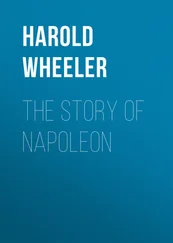Harold Wheeler - The Story of Wellington
Здесь есть возможность читать онлайн «Harold Wheeler - The Story of Wellington» — ознакомительный отрывок электронной книги совершенно бесплатно, а после прочтения отрывка купить полную версию. В некоторых случаях можно слушать аудио, скачать через торрент в формате fb2 и присутствует краткое содержание. Жанр: foreign_prose, История, foreign_edu, foreign_antique, на английском языке. Описание произведения, (предисловие) а так же отзывы посетителей доступны на портале библиотеки ЛибКат.
- Название:The Story of Wellington
- Автор:
- Жанр:
- Год:неизвестен
- ISBN:нет данных
- Рейтинг книги:3 / 5. Голосов: 1
-
Избранное:Добавить в избранное
- Отзывы:
-
Ваша оценка:
- 60
- 1
- 2
- 3
- 4
- 5
The Story of Wellington: краткое содержание, описание и аннотация
Предлагаем к чтению аннотацию, описание, краткое содержание или предисловие (зависит от того, что написал сам автор книги «The Story of Wellington»). Если вы не нашли необходимую информацию о книге — напишите в комментариях, мы постараемся отыскать её.
The Story of Wellington — читать онлайн ознакомительный отрывок
Ниже представлен текст книги, разбитый по страницам. Система сохранения места последней прочитанной страницы, позволяет с удобством читать онлайн бесплатно книгу «The Story of Wellington», без необходимости каждый раз заново искать на чём Вы остановились. Поставьте закладку, и сможете в любой момент перейти на страницу, на которой закончили чтение.
Интервал:
Закладка:
Finally, I must express the hope that my readers, as they progress over the field which I have endeavoured to open up to them, will share the love of the strong, silent Man of Duty which has grown upon me as I have become more intimate with the story of his life.
The path of duty was the way to glory.
His work is done.
But while the races of mankind endure,
Let his great example stand
Colossal, seen of every land.
Northwood, Middlesex.
CHAPTER I
The Fool of the Family
(1769–93)
“ I don’t know what I shall do with my awkward son Arthur. ”
Lady Mornington.Gathering clouds, dark and ominous, obscured the political horizon in the year 1769. The habitués of London coffee-houses discussed one of three things—“The Letters of Junius,” the most remarkable series of political exposures ever penned; the election of the notorious John Wilkes for Middlesex; and the rebellious conduct of the North American colonists. On the other side of the Channel the Duc de Choiseul was skilfully planning ways and means of fanning into a fierce outburst the flames of discontent now flickering in the West. To heap coals of fire on the country which, during the Seven Years’ War (1756–63), had enforced her claims to Canada and India, would be a triumph worthy of the statesman who had banished the Jesuits from the hereditary possessions of Louis XV.
Had the people who lived in those stirring times been gifted with the power of penetrating the future, their eyes would have turned in the eventful year of 1769 from the larger stages to the comparatively insignificant islands of Corsica and Ireland, for the former was the birthplace of Napoleon and the latter of Wellington, and both were born in 1769.
There are other remarkable coincidences connected with the childhood of Napoleon and Wellington. Their respective fathers were easy-going, unpractical men, their mothers were women of marked force of character, left widows early in life with large families. In addition, the hero of Austerlitz was the fourth child of Letizia Bonaparte, his conqueror at Waterloo the fourth son of the Countess of Mornington.
A certain amount of obscurity is associated with their juvenile days. Although the date of the entrance into the world of “the little Corporal” is now fairly well established, it was long before historians ceased to discuss it. There is still much uncertainty as to that of Wellington. The Duke was always vague on the point, and celebrated his birthday on the 1st May, which is the day following that on which he was baptized at St Peter’s, Dublin, presuming the parish register to be correct. 1 1 Sir Herbert Maxwell in his “Life of Wellington” (p. 2) suggests that the confusion arose owing to the then comparatively recent alteration of the calendar. Supposing Arthur Wellesley was born on the 1st May (new style), that date would be the 18th April (old style), and the 30th April (old style) the 12th May according to the present way of reckoning.
Lady Mornington announced that Arthur was a Mayday boy, but her nurse as stoutly maintained that the event took place on the 6th March. Dangan Castle, West Meath, and Mornington House, Marion Street, Dublin, contest the honour of being his birthplace. The witness for the country home is the afore-mentioned nurse; a prescription of the physician who attended Lady Mornington about the period was sent to a chemist in Ireland’s capital, and attests the claim of the town mansion. The matter is not of prime importance, but serves to show the somewhat casual habits of a less practical generation than our own. The real family name of the Westleys, Wesleys, or Wellesleys—the different forms were all used—was Colley or Cowley, but the Duke’s grandfather inherited the estates of his kinsman, Garret Wesley, on condition that he assumed that surname. He became Baron Mornington in 1747. It was the son of this fortunate individual, also a Garret, who was created the first Earl of Mornington in the year previous to his marriage to the eldest daughter of Viscount Dungannon. They became the parents of the future Duke of Wellington as well as of several other children.
Of Arthur Wellesley’s scholastic career little can be ascertained with certainty. We know that he spent a little while at a preparatory school in Chelsea, then a very different place from what it is now, and that he and his eldest brother, Lord Wellesley, who had succeeded his father on his sire’s death in 1781, were at the same house at Eton. Unfortunately the two rooms which they occupied are now demolished. While it would be incorrect to call Arthur a dull boy, he certainly displayed little interest in learning. Indeed, his mother was so cynical regarding his ability, or want of it, that she called him “the fool of the family.”
The dictum that Waterloo was won on the playing fields of Eton may have been true so far as other officers were concerned, but the younger Wellesley showed not the slightest interest in games. He preferred the fiddle to cricket, for he inherited his father’s passion for music. “I was a player on the violin once myself, sir,” he mentioned to an acquaintance in after years, “but I soon found that fiddling and soldiering didn’t agree—so I gave it up, sir! I gave it up!” He was a great admirer of Handel’s compositions.
One precious anecdote regarding his life at the famous public school has been spared to posterity, and appropriately enough it is a record of his first serious fight—not with a sword, but with fisticuffs. Robert Smith, brother of Sydney Smith, the witty divine and essayist, happened to be bathing in the river when Wellesley was passing. Prompted by some evil or jocular spirit the latter picked up a handful of small stones and began to pelt his fellow student. Smith yelled that he would thrash him if he did not stop. Wellesley defiantly dared him to do so. The enraged “Bobus” promptly waded out and accepted the challenge, which he regretted before many rounds had been fought.
Although Wellesley was by no means of a pugnacious disposition, a second fight, in which he was not victorious, took place during a holiday spent at the Welsh home of his maternal grandfather, Lord Dungannon. His opponent was a young blacksmith, named Hughes, who lived to hear of the mighty exploits of the Iron Duke. He was never tired of telling how he once conquered the vanquisher of Napoleon. It was his one title to fame.
After leaving Eton, Wellesley was taken to Brussels in 1784 by his mother, who found the many attractions of London society a heavy tax on a slender purse, for she had removed to the Metropolis on the death of her husband. As her son seemed to take little or no interest in anything but the army, and as that service was then considered a desirable alternative to the Church for the fool of the family, Lady Mornington accepted the offer of some friends to provide for his military education. Whatever ability her fourth son displayed seems to have been less obvious to her than to others, as frequently happens. “They are all,” she writes with reference to her family, “I think, endowed with excellent abilities except Arthur, and he would probably not be wanting, if only there was more energy in his nature; but he is so wanting in this respect, that I really do not know what to do with him.” However, the youth whom she described as being “food for powder and nothing more” was packed across the frontier to Angers. She herself returned to London in 1785, Wellesley proceeding to the quaint old town associated with King John of England. Here he had his first encounter with the French, and there is a celebrated picture showing him in conversation with the Marquis of Pignerol.
Читать дальшеИнтервал:
Закладка:
Похожие книги на «The Story of Wellington»
Представляем Вашему вниманию похожие книги на «The Story of Wellington» списком для выбора. Мы отобрали схожую по названию и смыслу литературу в надежде предоставить читателям больше вариантов отыскать новые, интересные, ещё непрочитанные произведения.
Обсуждение, отзывы о книге «The Story of Wellington» и просто собственные мнения читателей. Оставьте ваши комментарии, напишите, что Вы думаете о произведении, его смысле или главных героях. Укажите что конкретно понравилось, а что нет, и почему Вы так считаете.












